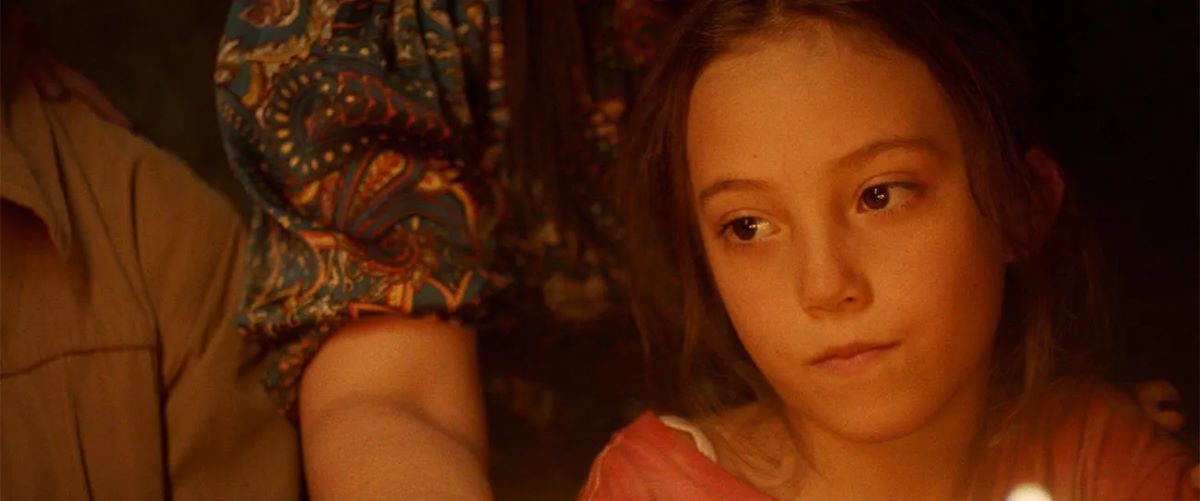Whilst driving across a bridge, seven-year-old Sol (Naíma Sentíes) and her mother engage in a rite of superstition, holding their breath and making a wish. Sol declares that her wish is for her father to live; her mother focuses on the road ahead. “Tōtem,” writer-director Lila Avilés’ sophomore feature, follows a day in the life of Sol and her family as they prepare a birthday party for her sick father, Tona (Mateo Garcia)—an event that’s gravity sets in as the hours pass—both a celebration of another year and a preemptive, heartfelt sending off.
While Tona rests in the bedroom, his sisters and nieces scramble around the house in anticipation of guests. Between baking cakes and fighting over time getting ready in the bathroom, the chaos of the household contains a familiar familial nostalgia. It’s the typical conversational movement between bickering, gossip, and catching up that’s inherent to hosting a family event. But over the course of the film, the emotional stakes begin to flood the air, permeating the space with a newer, deeper tension and cracking away at the family’s facades.
“Tōtem” has a stunning homemade quality. Seeming to be almost exclusively shot handheld, we feel as though we are a fly on the wall in moments of sweeping intimacy and blanket innocuousness alike. Each of the film’s characters, from Sol to her aunt Nuria (Montserrat Marañon), are given so much emotional subtext that we can find ourselves, both in history and present, applicable to their methods of coping and understanding. This depth is accounted for not through explicit dialogue, but quiet moments of solitary behavior that are entrusted to the stunning performances of the actors.
From Nuria’s hyper-fixation on Tona’s cake to her self-isolation and inability to be in the moment, we witness her restlessness: energy in desperate need of an output becomes placed anywhere tangible. For Sol, the film contains an animal motif that runs adjacent to her experience as she collects snails, converses with parrots, and muses on deadly snakes and the wing strength of hummingbirds. A reminder of nature’s dominance, these animals find their way into the domestic space, entering the home with the same creeping pace as the looming fate of her father. Sol’s interactions with them change as she comes to grips cognitively. She begins by moving the snails deep into the plants outside of her home to purposefully lining them up on the walls, an almost acceptance of the inevitable.
These details in Avilés’ writing are impeccably executed, peripheral elements of the film that amount to much greater than the sum of their parts. There’s not a single frame, monologue, or sequence in “Tōtem” that calls attention to itself. Rather, the authenticity is delivered on a platter of realism and meditation. Each relationship is built off quotidian interactions: scoldings, jokes, spats, and aimless conversation. The film’s emotional successes are due to this effortlessness afforded to the audience in believing that these aunts, cousins, grandparents, and daughters are real. It hits close to home because it feels close to home, and at times “Tōtem” feels less like a film and more like a family video. It balances the complexities of grief excellently, from laughter across tables and memories fondly recalled to indignant emotional distance and quivering smiles of intersected joy and despair.
“Tōtem” is an all-encompassing tale of anticipatory grief. It’s a gentle caress of a film, the type that touches you with pitiful care, leaving you with a consequence of comfort and sadness, but also the knowledge of being seen. With palpable tenderness, Avilés has crafted a story that delicately materializes the complexity of grief in different stages, and at different ages, and packages it for safe keeping. It is restrained, poignant, and the type of slice-of-life film that is absolutely precious to the portrayal of the human condition.




















